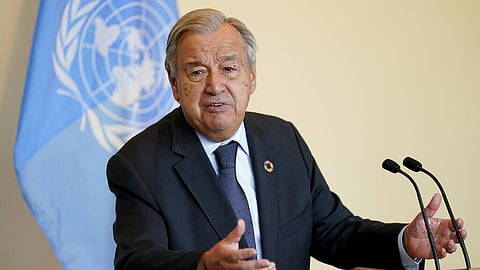

Amid rapidly rising tensions between India and Pakistan following the April 22 terrorist attack in Pahalgam, the spokesperson for the UN chief on Tuesday said that a confrontation between the two nuclear-armed nations would be catastrophic not only for South Asia but for the world.
UN Secretary General Antonio Guterres personally reached out to India’s External Affairs Minister S. Jaishankar and Pakistan Prime Minister Shehbaz Sharif, reiterating his "unequivocal condemnation" of the attack that killed 26 civilians—mostly tourists—in what is now the deadliest incident in Jammu and Kashmir since the 2019 Pulwama bombing.
“The Secretary-General expressed his deep concern at rising tensions between India and Pakistan and underscored the need to avoid a confrontation that could result in tragic consequences,” said UN spokesperson Stéphane Dujarric.
According to PTI, Dujarric said the Secretary General strongly stands against terrorism, wherever and whenever it occurs. And I think he has been very clear on that. What he wants to see is both sides move towards a de-escalation. I mean, the region and the world cannot afford a confrontation between India and Pakistan, which would be catastrophic for those two countries and for the world as a whole," Dujarric said.
External Affairs Minister Jaishankar welcomed Guterres’ condemnation and reiterated New Delhi’s firm stance on ensuring accountability.
“India is resolved that the perpetrators, planners, and backers of this attack are brought to justice,” Jaishankar posted on X.
India has firmly pointed to cross-border elements behind the attack and has already begun diplomatic and strategic responses, including the downgrading of diplomatic ties with Pakistan, the suspension of the Indus Waters Treaty, and the shutdown of the Attari land-transit post.
On the other side, Prime Minister Shehbaz Sharif rejected any Indian claims linking Pakistan to the Pahalgam attack, calling them "baseless." He reiterated Pakistan’s commitment to combating terrorism in all forms and proposed a "transparent and neutral investigation" into the incident.
Tensions have escalated between the two countries after terrorists opened fire near Kashmir's Pahalgam town on April 22, killing 26 people, mostly tourists.
After the attack, India downgraded diplomatic ties with Pakistan and announced a raft of measures, including expulsion of Pakistani military attaches, suspension of the Indus Water Treaty of 1960 and immediate shutting down of the Attari land-transit post.
Prime Minister Narendra Modi has vowed a “harshest response” to the attack, stating that the armed forces have "complete operational freedom" to determine the timing and scale of India's reaction.
On Tuesday, PM Modi asserted that the armed forces have "complete operational freedom" to decide on the mode, targets and timing of India's response to the Pahalgam terror attack.
He said this while chairing a meeting that was attended by Defence Minister Rajnath Singh, NSA Ajit Doval and the chiefs of three services.
Modi affirmed that it is the national resolve to deal a crushing blow to terrorism, government sources said.
Jaishankar speaks to counterparts from seven non-permanent members of UNSC
On Tuesday, Jaishankar held discussions with the foreign ministers of seven non-permanent members of the UN Security Council (UNSC)—Algeria, Greece, Guyana, Panama, Slovenia, Sierra Leone, and Somalia—to brief them on cross-border elements involved in the attack.
The phone conversations came days after the UN Security Council (UNSC) issued a statement condemning the terrorist attack in Pahalgam, but not before Pakistan, backed by China, worked to water it down.
(With inputs from PTI)